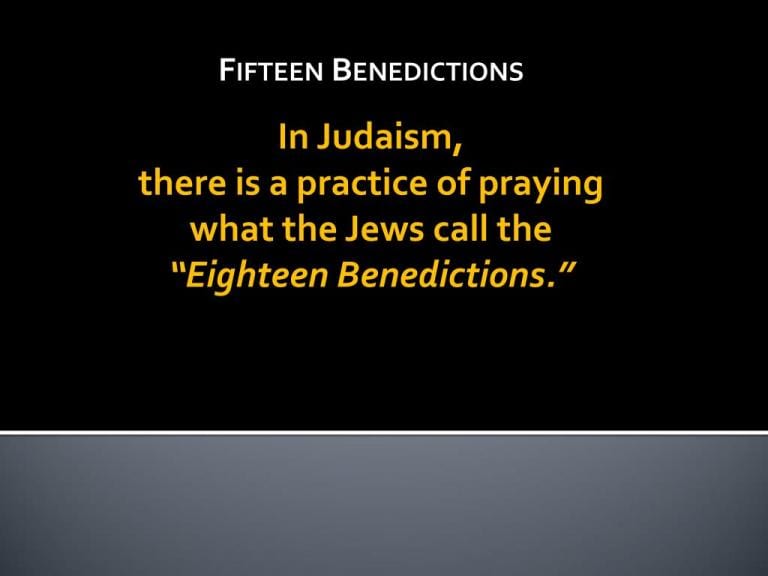 Religious Jews used to be required to say a lengthy prayer every day known as the Eighteen Benedictions. It is also called The Amidah Prayer. Some think the so-called “Lord’s Prayer” that Jesus taught–recorded in Matthew 6.9-13 and Luke 11.2-4–represents somewhat of a condensation of the Amidah Prayer. Well, not quite.
Religious Jews used to be required to say a lengthy prayer every day known as the Eighteen Benedictions. It is also called The Amidah Prayer. Some think the so-called “Lord’s Prayer” that Jesus taught–recorded in Matthew 6.9-13 and Luke 11.2-4–represents somewhat of a condensation of the Amidah Prayer. Well, not quite.
The twelfth of the eighteen benedictions in the Amidah Prayer is a curse against Christians and other heretics. It says, “For the apostates let there be no hope, and may the kingdom of the arrogant be quickly uprooted in our days; and may the Nazarim and the Minim instantly perish; may they be blotted from the book of the living, and not be written with the righteous. Blessed are you Lord, humbler of the arrogant.”
Many scholars and historians claim that at least some of these benedictions existed prior to the Romans’ defeat of Jews in 70 AD and that the twelfth benediction, or at least the part about the Nazarim, was added perhaps 200 years later.
Nazarim is Aramaic for Nazarenes, and minim means “heretic.” The earliest disciples of Jesus were not called “Christians;” rather, they were called “Nazarenes.” It was only later, starting in the Gentile city of Antioch, where a community of believers in Jesus consisted of both Jews and Gentiles, that people were first called “Christians.” For we read, “it was in Antioch that the disciples were first called ‘Christians'” (Acts 11.26; cf. 26.28; 1 Peter 4.16). Thus, Nazarim in the twelfth benediction represents a curse against what we would call Christians.
Jesus’ earliest disciples were called Nazarenes since he was a “Nazarene.” Nine times in the New Testament gospels and the book of Acts we read, “Jesus the Nazarene;” and “Jesus Christ the Nazareth” appears twice in Acts. The reason for this identification, of course, is that Jesus had grown up and lived as an adult in the town of Nazareth, which was in Galilee, about sixty miles north of Jerusalem.
Thus, when Pontius Pilate had the headboard nailed to Jesus’ cross, identifying who he was, the author of the Gospel of John writes, “Pilate also had an inscription written and put on the cross. It read, ‘Jesus of Nazareth, the King of the Jews'” (John 19.19).
We read in the book of Acts about the Apostle Paul being brought as a prisoner before Governor Felix at Caesarea to be questioned by him. Israel’s high priest and some elders, represented by an attorney named Tertullus, said to the governor concerning Paul, “We have, in fact, found this man a pestilent fellow, an agitator among all the Jews throughout the world, and a ringleader of the sect of the Nazarenes” (Acts 24.5).
Yet many of the Eighteen Benedictions are full of beautiful and godly exhortations directed toward Jews and praises said of God. For example, the fifth benediction says, “Cause us to repent, Lord, to you, and we will repent. Renew our days as at the start. Blessed are you Lord, who desires repentance.” And the sixth benediction begins, “Forgive us our Father, for we have sinned against you. . . . Blessed are you Lord, who abundantly forgives.”
Also according to the book of Acts, when the Apostle Peter preached his second sermon to his countrymen, Jews, he challenged them concerning their responsibility for the execution of Jesus, “Repent therefore, and turn to God so that your sins may be wiped out, so that times of refreshing may come from the presence of the Lord, and that he may send the Messiah appointed for you, that is, Jesus, who must remain in heaven until the time of universal restoration that God announced long ago through his holy prophets” (Acts 3.19-21).
The Bible has many prophecies that predict a significant remnant of Jews will repent in the latter days, and then the Messiah will come, just as Peter exhorted. I believe that part of this penitence must be the Jews’ removal of the twelfth of their eighteen benedictions. Having said this, I also agree that in the history of Christianity, there has been much deplorable persecution of Jews by so-called Christians, even by the Catholic Church itself, which it subtly admits in Vatican II. Thus, as Catholics have done therein, Jews need to do likewise.












